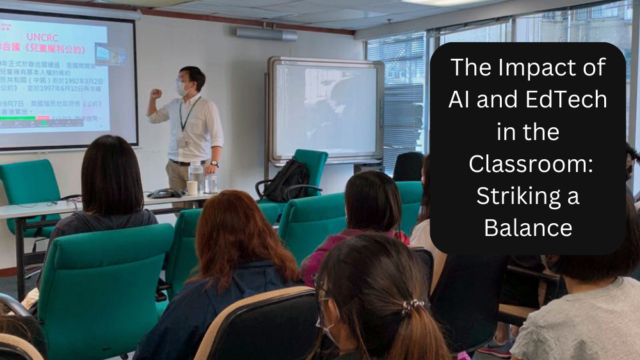The integration of Artificial Intelligence (AI) and EdTech platforms has revolutionized the learning landscape, offering personalized learning experiences and opening new possibilities for students. However, while the positive impact of AI-powered platforms is evident, it is crucial to strike a balance to avoid overdependence on technology. This article explores the enhanced learning experiences facilitated by AI in education while emphasizing the need for critical thinking and active engagement to ensure a holistic approach to student development.
Personalized Learning: Empowering Students

Empowering Students AI-powered platforms provided by EdTech companies have the potential to transform the learning experiences of students. Adaptive learning algorithms analyze student performance data and tailor educational content to their individual needs. This personalized approach enables students to receive targeted support and guidance, facilitating a deeper understanding of complex concepts. By empowering students to progress at their own pace, AI tools foster a sense of autonomy, motivation, and ownership of the learning process.
However, a potential negative implication lies in the risk of overdependence on technology. While AI tools offer valuable support, it is crucial to strike a balance to preserve the development of problem-solving skills. Educators play a vital role in guiding students to utilize AI tools as aids rather than substitutes for active engagement and independent thought. Encouraging students to approach AI-powered platforms as resources for exploration and deeper comprehension will ensure the development of essential cognitive abilities.
Active Engagement
Emphasizing Critical Thinking As AI enhances learning experiences, it is vital to maintain a focus on critical thinking and active engagement. Students must be encouraged to analyze, evaluate, and synthesize information, rather than relying solely on pre-packaged content provided by AI-powered platforms. By leveraging AI as a tool for support, students can engage actively with the material, question assumptions, and develop independent thought processes.
Teachers’ guidance is indispensable in fostering critical thinking skills. Educators can design activities that require students to go beyond automated responses and employ analytical reasoning. By incorporating open-ended questions, group discussions, and project-based assignments, educators can ensure that students develop the ability to think critically, creatively, and apply their knowledge in real-world scenarios.
Striking a Balance
The Role of Educators and Technology To strike a balance, educators must adopt a mindful approach to integrating AI tools in the classroom. Rather than perceiving AI as a threat, educators should embrace it as a powerful ally in creating engaging and effective learning environments. By leveraging AI-powered platforms, educators gain insights into student progress, identify areas of improvement, and tailor their teaching strategies accordingly.
Read: Top Tips to Pass IB MYP Chemistry
However, educators should maintain their role as facilitators and guides in the learning process. They possess the expertise to nurture critical thinking skills, provide context, and encourage meaningful discussions. Educators should supplement AI tools with interactive activities, collaborative projects, and opportunities for students to showcase their creativity. By blending AI with human expertise, educators can create a comprehensive learning experience that combines personalized support, critical thinking, and active engagement.
Education on AI ethics
Education on AI ethics is an essential component of preparing students to navigate the increasingly complex digital landscape. Educators have a unique opportunity to foster critical thinking skills and cultivate ethical awareness among students when it comes to the use of artificial intelligence.
Incorporating discussions on AI ethics, digital citizenship, and responsible technology use into the curriculum empowers students to understand the ethical implications of AI and make informed decisions. By engaging in meaningful conversations, students develop a deeper appreciation for the societal impact of AI and its potential consequences.
Through these discussions, students are encouraged to question the ethical considerations surrounding AI, such as privacy, bias, and fairness. They learn to critically analyze the use of AI in different contexts, such as education, healthcare, and employment. Students explore real-life scenarios where AI has ethical implications, allowing them to apply their understanding and think through the potential consequences and dilemmas that arise.
AI-powered platforms offered by EdTech companies have the potential to greatly enhance learning experiences for students. Through adaptive learning algorithms, students receive personalized instruction that fosters deeper understanding and motivation. However, it is crucial to strike a balance to prevent overdependence on technology. Educators play a vital role in guiding students to leverage AI tools as aids for active engagement, critical thinking, and independent thought. By blending AI with human expertise, educators can create a holistic learning environment that empowers students to thrive in the digital era.
By embracing AI in education and striking a balance between technology and human guidance, we can unlock the full potential of AI-powered platforms while ensuring the development of essential skills and competencies in students. The future of education lies in the harmonious integration of AI and human expertise, providing students with personalized learning experiences that foster critical thinking, creativity, and a lifelong love for learning.
Author’s Bio:
Sophia William is a freelance writer associated with quizplus.com. With a passion for creating engaging and informative content, Sophia brings a wealth of expertise to her writing endeavors.

